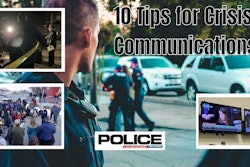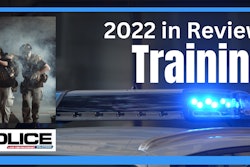Every year there are two or three areas of focus that—either by arbitrary executive fiat or in response to an obvious emerging need—dominates the discussion among police trainers. For example, in recent years that focus has tended to be de-escalation training, and implicit bias training, and the adoption of VR / AR simulation technology.
Looking ahead to 2023, it's pretty easy to predict that with rising crime in many American cities—coupled with the decline in the numbers of officers on the streets in many of those places—an amplified interest in predictive policing practices and intelligence-led policing initiatives. It's also not unreasonable to expect that in the wake of the abject failure of the police response to the massacre at the Robb Elementary School in Uvalde (TX) that active shooter response training will get an increased emphasis.
Invariably however, areas of emphasis emerge that are perhaps somewhat unexpected. Last year at this time, we examined three topics that came to mind among three leading law enforcement trainers presented with that question. One pointed to improving decision-making skills and abilities. Another indicated a need for renewed attention on duty-to-intervene strategies and tactics. A third individual suggested the notion of viewing training as a recruiting tool.
Here are three more things for trainers to think about that may not have otherwise come immediately to mind as you set about the process of planning your training calendar for 2023.
Providing Training Above and Beyond Minimums
Fletch Fuller—president and CEO of ReadyUp Tactical LLC and the High Liability Training Coordinator for a large law enforcement agency in Florida—says that agencies should make every effort to provide training in even the most niche proficiencies.
"Everybody's got staffing issues to some degree," Fuller says, "but think about running sustainment training or advanced training for above and beyond the basic qualifications stuff. You have stuff that's going to be mandatory—your weapons qualifications, your basic use-of-force policy revisions and stuff like that—but I think you should make time to run classes that are that are not just that. Those [classes] should be made available to people to attend on a voluntary basis."
Fuller explains, "There's only so much that the agency is going to make mandatory—eventually the plate gets kind of full with mandatory and [officers] just become totally saturated and the administrators are not always necessarily sitting in the best spot to have a good view of what the people need. So sometimes you make an advanced specialized class available. Find something that there's an interest in and offer opportunities for advanced and specialized training. It could be anything—ground fighting, weapon retention, whatever it happens to be—and make it available to people."
Fuller emphasizes the importance of offering those opportunities and resisting the temptation to discount them just because there's only a limited interest.
"The biggest piece of advice is unless you absolutely have to try to avoid the temptation to cancel a class due to low numbers," Fuller says. "Sometimes people will sign up for those classes and they're nervous—they've got to work up their nerve because it's something that they're really uncomfortable about. You've got 'em at the point to where they have a high interest level, but they don't have a high confidence level. So strike while the iron is hot."
Fuller explains that someone simply crunching numbers will look at a specialized class with only one or two people signed up and decide that the investment isn't worth the potential return. But that thinking misses the point of offering that advanced training in the first place.
"You get an administrator somewhere that says, 'Well, we're not gonna run the class for two people, and they cancel it. Now, that person that worked up the nerve to sign up for that class and to step out of their comfort zone and go learn something that could save their life one of these days. All of a sudden it's no longer on their plate and they go back to their shift and they fall right back into the routine. If you're not going to run that class anytime soon, you may never see 'em again. You had 'em and you lost 'em."
Adapting to and Engaging Potential New Recruits
Dan Greene—who serves as executive director of the National Association of Field Training Officers (NAFTO)—says that trainers have to continue to adapt to the new generations of people coming into the ranks.
In politics, it's said that a candidate has to "meet the people where they are" in order to reflect and represent the voters in whatever office they seek (or hold). This means understanding the constituency with fluency in their own language, not the language of the elected leader.
In police training, this means finding ways to incorporate the ever evolving "culture" of the mainstream American into the existing culture of law enforcement.
"It's always about the older generation—so to speak—trying to communicate to the younger generation," Greene says. "It's nearly speaking a different language—it's almost a foreign language to both sides especially nowadays where we need to speak a language digitally and electronically and virtually."
Greene continues, "I can't be abrasive or insensitive to things like 'inclusion.' Being 'inclusive' might be a term that some of us didn't grow up with in the profession or even as youth ourselves, but we have to definitely wrap our arms around that. When the youth that are attracted to our jobs talk about inclusiveness—and they ask us about LGBTQ policies—well, while these things weren't a priority for me when I was applying for a job, it certainly is now."
Greene says this thinking permeates into the realm of recruiting in a very nuanced but critical way.
"Old school marketing of police work was always like, 'Look at how cool our job is. Don't you like it?' Well, I think what we have to do now is say, "We think you are cool. Look how you can help us. Not necessarily how the job can help you, but look how you can help us."
Greene concludes, "We already know how valuable and noble the profession is. I think the goal is convincing the youth how they are valuable to it."
Complete Readiness for Post-Incident Action
Betsy Brantner Smith—nationally renowned trainer with The Winning Mind LLC and spokesperson for the National Police Association—says that agencies and individuals should train to be better prepared for the myriad actions that follow a critical incident.
"We should have in every training class—every agency—a real practical agency, county, and state specific plan on what to do immediately post deadly or extreme force for every officer on every agency," Brantner Smith says. "I'm talking about it being very multifaceted—everything from what to do about your social media to how to have a real plan for your family."
Brantner Smith notes that agencies have training in place for the obvious things to do following any controversial incident—whether that's a use-of-force matter or something else—such as taking the officer to the hospital for physical wellness evaluation and calling in a union representative.
"There's policy on all of that, but there's no policy for protecting the officer's rights," she says.
In today's world, certain members of the press and the public are prone to hastily draw conclusions based on their anti-police bias, and launch into action. Some may even show up at an officer's home in protest.
She contends that departments should have policies to address this possible eventuality, and everyone from agency leadership to rank-and-file officers should be trained on what to do in response.
Brantner Smith says, "What are you doing when you've got to abandon your home—when you have to relocate your family—because you've been doxed [and] Black Lives Matter and Antifa is showing up on your front yard? Who's got a plan for that? Who's got the passwords to your social media? Who can pull all your social media? What about your kids? What about your kids' school?
Brantner Smith concludes, "We absolutely must look beyond the norm that we have. We basically have to anticipate or game out virtually everything that could possibly happen in a post George Floyd world of law enforcement."
Pressing Further the Dialog on Police Training
We're now only a couple of weeks into 2023, and although budgets have already been set and primary priorities have already been decreed, police leaders and training cadres should take any and every opportunity to include in this year's training schedule some of the thoughts noted here.
It's a worthwhile exercise to speak with officers, shift supervisors, academy instructors, and any other "stakeholder" in the organization to unearth and understand areas in which even the smallest most incremental improvement can be made through increased training. The obvious areas of focus will get the focus they deserve simply be being obvious, but it takes some serious contemplation and creativity to find those little elements that don't immediately spring to everyone's mind.
Here's wishing each and every one of you a safe and successful 2023.
















